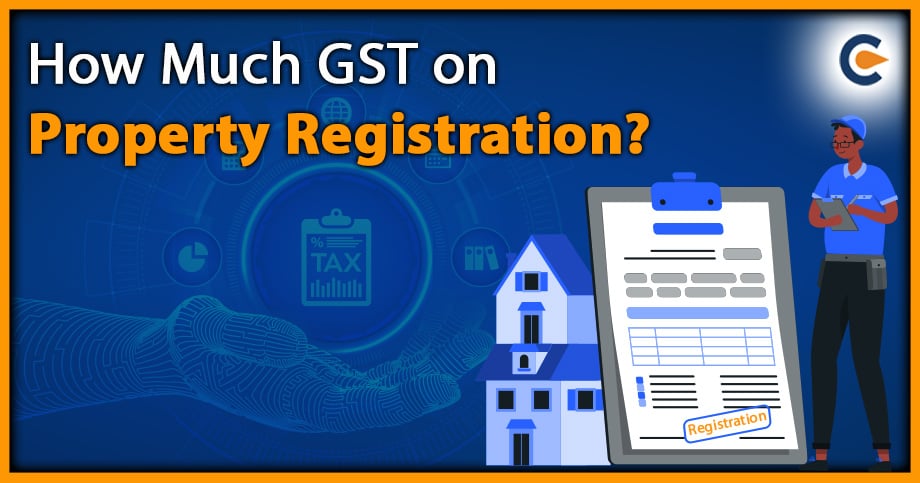The GST is an indirect tax that applies to goods and services. It came into effect in India on July 1, 2017, and it subsumed all other indirect taxes such as value-added tax (VAT), service tax[1], central excise duty, etc. The supply of goods and services is subject to the GST, which is intended to simplify the tax system and make it more transparent. GST on property registration is an important aspect of the overall GST regime in India, and it has a significant impact on the real estate sector. In this blog, we will discuss the various aspects of GST on property registration in detail.
Background of GST
The implementation of the GST in India was a major tax reform that aimed to bring about a uniform tax structure across the country. Prior to the implementation of GST, the tax system in India was fragmented and complex, with multiple indirect taxes being levied at different rates in different states. This resulted in confusion and increased costs in various industries, including the real estate sector.
In the case of property registration, the taxes levied included value added tax (VAT), service tax, and stamp duty. These taxes were levied at different rates in different states, leading to confusion and complexity in the process of property registration. Developers and homebuyers were often unsure about the tax liabilities and the amount of tax to be paid on property transactions. This lack of clarity resulted in delays and increased costs in property transactions.
The introduction of the GST aimed to address these issues by replacing multiple indirect taxes with a single tax system. The GST is an indirect tax levied on the sale of goods and services with the goal of streamlining and improving the tax system. The introduction of the GST has had a significant impact on numerous industries, particularly the real estate industry.
GST on Property Registration: Applicability
Under the GST, the sale of immovable property is considered a supply of services. Hence, GST is levied on the transaction value of the property. The GST on property registration is applicable to all kinds of property sales, such as:
- Sale of under-construction property
- Sale of fully constructed property
- Sale of a plot of land
- Transfer of property by way of gift, lease, or exchange
The fact that not all properties are subject to GST should be noted. Properties that are sold after the completion certificate has been issued are exempt from GST. Additionally, properties that are sold before completion and are still under construction are subject to GST, but at a reduced rate of 5%.
Input Tax Credit (ITC) under GST
Under GST, Input Tax Credit (ITC) is an important aspect of the tax regime that allows developers to claim credit for the GST paid on the purchase of goods and services that are used in the construction of the property. ITC helps to reduce the cost of construction, which can ultimately benefit the homebuyer. The developer can claim ITC on goods and services like cement, steel, labour, etc.
For example, if a developer purchases cement for Rs. 1 lakh and pays a GST of Rs. 18,000 on it, the developer can claim a credit of Rs. 18,000 towards the GST payable on the sale of the property. This reduces the overall cost of construction and can result in a lower selling price for the property.
However, it is important to note that ITC is available only to developers and not to individual homebuyers. Homebuyers cannot claim ITC on the GST paid at the time of property registration.
GST on Property Registration: Impact
The introduction of GST has had a significant impact on the real estate sector in India. It has brought about a uniform tax structure across the country, which has simplified the tax system and made it more transparent. Developers and homebuyers now have a clearer understanding of the tax liabilities and the amount of tax to be paid on property transactions.
The implementation of GST has also led to a reduction in the overall cost of construction, as developers can claim ITC on the GST paid on the purchase of goods and services used in the construction of the property. This can result in a lower selling price for the property, which can make it more affordable for homebuyers.
However, the increased rate of GST on property registration has also led to an increase in the overall cost of property transactions. The GST rate of 18% on property registration is a significant increase from the previous tax rates. This has led to an increase in the overall cost of the property, which can make it difficult for some homebuyers to afford.
How much GST on Property Registration?
The GST rate on property registration in India is currently set at 18%. This rate is applicable to the sale of all types of immovable properties, such as land, buildings, and apartments. The GST on property registration is levied on the transaction value of the property, which includes the price of the property and other charges such as maintenance fees, parking fees, and other similar charges.
It is important to note that properties that are sold after the completion certificate has been issued are exempt from GST. Additionally, properties that are sold before completion and are still under construction are subject to GST, but at a reduced rate of 5%.
The increased rate of GST on property registration has led to an increase in the overall cost of property transactions. It is important for homebuyers to factor in the GST costs while budgeting for the purchase of a property. Developers can claim an input tax credit (ITC) on the GST paid on the purchase of goods and services used in the construction of the property. However, ITC is not available to individual homebuyers.
Hence, the GST rate on property registration in India is currently 18%. Homebuyers should be aware of the GST implications while purchasing a property and factor in the GST costs while budgeting for the purchase.
Conclusion
In conclusion, the GST on property registration is an important aspect of the overall GST regime in India. The implementation of the GST has simplified the tax system and made it more transparent, leading to a reduction in the overall cost of construction. However, the increased rate of GST on property registration has also led to an increase in the overall cost of property transactions. It is important for homebuyers to be aware of the GST implications when purchasing a property and to factor in the GST costs when budgeting for the purchase.
Read Our Article: How To Do GST Registration For Property Dealers?











